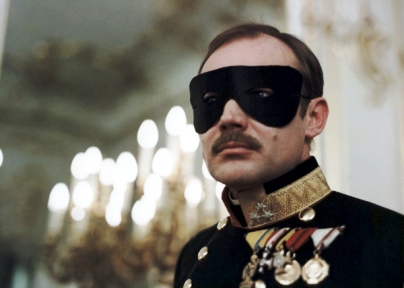
 A real life scandal from the pre-World War I era, involving an officer in the Austro-Hungarian Army, is brought to life by director Istvan Szabo, and his brilliant star, Klaus Maria Brandauer.
A real life scandal from the pre-World War I era, involving an officer in the Austro-Hungarian Army, is brought to life by director Istvan Szabo, and his brilliant star, Klaus Maria Brandauer.
Hungarian director Istvan Szabo is most famous for his excellent 1981 film, and surprise international hit, Mephisto, starring Klaus Maria Brandauer, and this is understandable. But I would like to draw your attention to another film by Szabo starring the same actor, and made in 1985. It’s called Colonel Redl, and in it Brandauer plays Alfred Redl, a young Ukrainian of humble background, who at the turn of the 20th century, rises through the ranks of the Austro-Hungarian army through his unfailing devotion and gratitude to the monarchy. But the more power he gains, the more difficult it is to reconcile his good nature with the demands made on him, while his ambivalence about his ethnic origins, and his sexuality, threatens to undermine everything he’s worked for.
Based on an actual army scandal that happened prior to World War I, this is one of the more cogent dramas about political power ever filmed. Szabó’s evocation of the waning years of the Hapsburg empire is both visually lush and psychologically acute. With a few well-placed details of speech, manner, and dress, he is able to communicate volumes about the power of class and custom in the Old World. More importantly, the film shows how a political system based on force becomes a law of its own, sucking even those with the best intentions into its vortex against their will, and favoring ruthlessness and cunning over values and ideals.
Redl is a complex, elusive character. While he is willing to sacrifice old friendships in order to advance himself, he retains an emotional attachment to his childhood friend Kubinyi (played by Jan Niklas), a Hungarian aristocrat, and ends up having an affair with Kubinyi’s married sister, while agreeing to a loveless marriage of convenience in order to stave off rumors of homosexuality. His intense ambition, combined with a tendency towards sentiment, and a secret shame about his origins (it’s never quite clear whether he is part Jewish or not), makes his position untenable once he enters the orbit of the archduke Ferdinand (played by the great Armin Mueller-Stahl), a world-class schemer looking for a scapegoat.
Brandauer’s quietly controlled performance, with its appealing mixture of vigor and naiveté, carries the film. He takes the screenplay’s difficult truth—that an essentially good man can also be corrupt, simply by giving his self-interested assent to power—and he makes it alive for us, with his gestures, his movements, and the curious and conflicting glances of his eyes. It’s an extremely intelligent, focused piece of work, and it lends the screenplay, which presupposes a certain degree of historical knowledge on the part of the viewer, a greater depth and poignancy than its period-piece aesthetics would have warranted otherwise. Indeed, the combination of Szabo’s keen historical sense with Brandauer’s feeling for his character allows us a rare glimpse into the tragic effects of despotic power on the soul.

